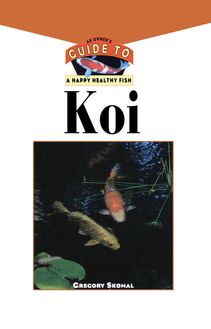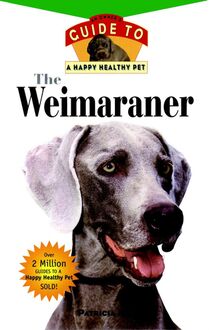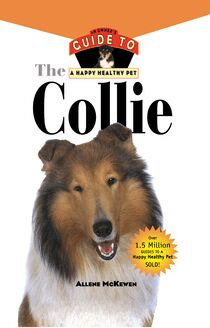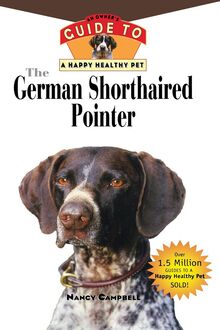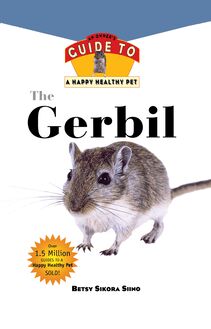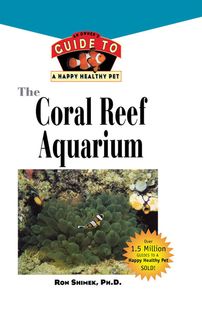Collie , livre ebook
103
pages
English
Ebooks
2009
Vous pourrez modifier la taille du texte de cet ouvrage
Obtenez un accès à la bibliothèque pour le consulter en ligne En savoir plus
Découvre YouScribe en t'inscrivant gratuitement
Découvre YouScribe en t'inscrivant gratuitement
103
pages
English
Ebooks
2009
Vous pourrez modifier la taille du texte de cet ouvrage
Obtenez un accès à la bibliothèque pour le consulter en ligne En savoir plus
Publié par
Date de parution
18 mai 2009
Nombre de lectures
2
EAN13
9780470493588
Langue
English
Poids de l'ouvrage
3 Mo
PART ONE: Welcome to the World of the Collie.
1. What Is a Collie?
2. The Collie's Ancestry.
3. The World According to the Collie.
PART TWO: Living with a Collie.
4. Bringing Your Collie Home.
5. Feeding Your Collie.
6. Grooming Your Collie.
7. Keeping Your Collie Healthy.
PART THREE: Enjoying Your Dog.
8. Basic Training (Ian Dunbar, Ph.D., MRCVS).
9. Getting Active with Your Dog (Bardi McLennan).
10. Your Dog and Your Family (Bardi McLennan).
11. Your Dog and Your Community (Bardi McLennan).
PART FOUR: Beyond the Basics.
12. Recommended Reading.
13. Resources.
Publié par
Date de parution
18 mai 2009
Nombre de lectures
2
EAN13
9780470493588
Langue
English
Poids de l'ouvrage
3 Mo
The
Collie
Howell Book House
IDG Books Worldwide, Inc. An International Data Group Company Foster City, CA Chicago, IL Indianapolis, IN New York, NY Southlake, TX
Howell Book House IDG Books Worldwide, Inc. An International Data Group Company 919 E. Hillsdale Boulevard Suite 400 Foster City, CA 94404
Copyright © 2000 by Howell Book House, a wholly owned subsidiary of IDG Books Worldwide, Inc.
All rights reserved. No part of this book may be reproduced or transmitted in any form or by any means, electronic or mechanical, including photocopying, recording, or by any information storage and retrieval system, without permission in writing from the Publisher.
Howell Book House is a registered trademark of Macmillan General Reference USA, Inc., a wholly owned subsidiary of IDG Books Worldwide, Inc.
The IDG Books Worldwide logo is a registered trademark under exclusive license to IDG Books Worldwide, Inc., from International Data Group, Inc.
For general information on IDG Books Worldwide’s books in the U.S., please call our Consumer Customer Service department at 800-762-2974. For reseller information, including discounts and premium sales, please call our Reseller Customer Service department at 800-434-3422.
Library of Congress Cataloging-in-Publication Data The collie. p.cm—(A Owner’s guide to a happy healthy pet) Includes bibliographical references (p.). ISBN 1-58245-008-0 I. Collie. I. Howell Book House. II. Series.
SF429.C6C56 1999 636.737 4—dc21
Manufactured in the United States of America 10 9 8 7 6 5 4 3 2 1
Series Director: Amanda Pisani Book Design: Michele Laseau Cover Design: Iris Jeromnimon Illustration: Laura Robbins
Photography: All photography by Mary Bloom unless otherwise noted. Front cover, inset and back cover photos by Mary Bloom.
Production Team: Heather Pope, Carol Sheehan, Julie Tripetti
Contents
part one
Welcome to the World of the Collie
1 What Is a Collie?
2 The Collie’s Ancestry
3 The World According to the Collie
part two
Living with a Collie
4 Bringing Your Collie Home
5 Feeding Your Collie
6 Grooming Your Collie
7 Keeping Your Collie Healthy
part three
Enjoying Your Dog
8 Basic Training by Ian Dunbar, Ph.D., MRCVS
9 Getting Active with Your Dog by Bardi McLennan
10 Your Dog and Your Family by Bardi McLennan
11 Your Dog and Your Community by Bardi McLennan
part four
Beyond the Basics
12 Recommended Reading
13 Resources
part one
External Features of the Collie
chapter 1
What Is a Collie?
To know what a Collie is, just ask a child. Generations of children have grown up reading Albert Payson Terhune’s wonderful Collie stories, Eric Knight’s Lassie Come Home, and seeing “Lassie” in the movies or on TV, tirelessly coming to the rescue, time and again. No breed has even come close in capturing public affection and imagination.
Wherever we take our Collies, someone always stops us with a wonderful story of the Collie they owned. We find the “Collies in fiction” are matched and even exceeded by the true exploits of real Collies everywhere.
Collies are the caretakers of their world, and nothing is so small it escapes their notice. They were developed as hardy, intelligent herding dogs by self-sufficient inhabitants of isolated communities in Scotland and other parts of the British Isles. They were more than stock dogs, they were partners, for their human family’s very survival depended on them. Those first Collies were bred to have almost human intelligence and reasoning ability; to be gentle, loving and loyal; and to staunchly defend those they loved. Happily, they have passed this legacy to the Collies that brighten peoples’ lives today.
In many ways, the Collie is the ideal family dog and enjoys a place in many hearts the world over.
Collies have won the national Dog Hero of the Year award more often than any other breed. With Queen Victoria’s patronage, the Collie caught the attention of a dedicated group of breeders in England who determined to make this breed as beautiful on the outside as on the inside. That they succeeded is a happy historical fact.
The Breed Standard
All recognized dog breeds have a standard that serves as a description of the ideal dog. No one dog will meet every quality in the standard, but the goal of breeders is to produce dogs that bear that standard’s characteristics.
The following excerpts from the official American Kennel Club standard for the Collie appear in italic type. Because of the length and technical nature of the standard, only the most important sections have been excerpted.
WHAT IS A BREED STANDARD?
A breed standard—a detailed description of an individual breed—is meant to portray the ideal specimen of that breed. This includes ideal structure, temperament, gait, type—all aspects of the dog. Because the standard describes an ideal specimen, it isn’t based on any particular dog. It is a concept against which judges compare actual dogs and breeders strive to produce dogs. At a dog show, the dog that wins is the one that comes closest, in the judge’s opinion, to the standard for its breed. Breed standards are written by the breed parent clubs, the national organizations formed to oversee the well-being of the breed. They are voted on and approved by the members of the parent clubs.
G ENERAL C HARACTER
The standard begins with a first impression: The Collie is a lithe, strong, responsive, active dog carrying no useless timber, standing naturally straight and firm. The deep, moderately wide chest shows strength, the sloping shoulders and well-bent hocks indicate speed and grace, and the face shows high intelligence. The Collie presents an impressive, proud picture of true balance . . .
The standard draws a mental picture of a proud dog—graceful, balanced and strong. You can almost see him standing on a hillside watching his flocks, his beautiful head high and alert, his body ready to move at a moment’s notice. For all the technical explanations necessary to describe in detail all that goes into the making of this proud, beautiful animal, you now have in your mind’s eye the picture that is “Collie.”
H EAD
The Collie’s head and expression set him apart from other breeds. The head is described as inclined to lightness . . . A heavy-headed dog lacks the necessary bright, alert, full of sense look that contributes so greatly to expression. Both in front and profile view the head bears a general resemblance to a well-blunted lean wedge, being smooth and clean in outline and nicely balanced in proportion ... A midpoint between the inside corners of the eyes (which is the center of a correctly placed stop) is the center of balance in length of head. The teeth are of good size, meeting in a scissors bite. Overshot or undershot jaws are undesirable, the latter being more severely penalized. In a scissors bite, the upper incisors overlap just outside and in front of the lower incisors. When the upper incisors extend beyond the lowers, the dog is “overshot”; when the lower incisors extend beyond the upper ones, the dog is “undershot.” It is common for young adolescents to be slightly overshot as the head lengthens, but they outgrow it, and a very slight overshot is not considered a serious fault. More extensive overshot bites give a chinless or weak appearance. An undershot bite is foreign to the breed, distorting the shape of the head and giving it a “Roman” (concave) profile. Undershot and severe overshot bites often cause eating, alignment and dentition problems.
The Collie is a proud dog — graceful, balanced and strong.
E YES
Because of the combination of the flat skull, the arched eyebrows, the slight stop and the rounded muzzle, the foreface must be chiseled to form a receptacle for the eyes and they are necessarily placed obliquely to give them the required forward outlook . . . They are almond-shaped, of medium size and never properly appear to be large or prominent . . . The eyes have a clear, bright appearance, expressing intelligent inquisitiveness, particularly when the ears are drawn up and the dog is on the alert ... A large, round, full eye seriously detracts from the desired “sweet” expression. Perhaps the eyes make the most lasting impression, for they are the very soul of the breed. The Collie’s expression is soft, sweet and enchanting. You seem unable to pull away as you gaze at this lovely face, nor can you resist smiling back. It is the very unique combination of head parts that produces this charming effect. Other breed standards also call for an almond-shaped eye, or even an obliquely set eye, but they still do not produce the picture that is uniquely “Collie.”
Because of the length and shape of the Collie’s skull and the chiseling effect necessary to set the eyes properly in the skull, the almond-shaped eye not only slants upward but to the side. Perhaps no other feature so sets the Collie apart from other breeds or leaves such a lasting impression.
The distinctive Collie’s ears contribute to his soft expression.
E ARS
When in repose the ears are folded lengthwise and thrown back into the frill. On the alert they are drawn well up on the backskull and are carried about three-quarters erect, with about one-fourth of the ear tipping or “breaking” forward. A dog with prick ears or low ears cannot show true expression. The ears set off the expression, the alert, slightly tipped shape aiding the softness of expression.
B ODY AND L EGS
The body is described as firm, hard and muscular, a trifle long in proportion to height, with straight, muscular forelegs and sinewy hind legs, muscular at the thighs. The hocks and stifles are well bent. This refers to the angles in the conformation of the rear leg; when there is sufficient angulation (bend) the dog will move with a stronger backward push with more reach, giving more flexibility, speed and smoothness.
G AIT
The beautiful, flowing gait is characteristic of the breed. Remember our first impre
